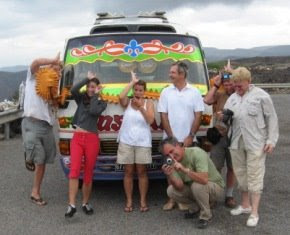 Decan is a non-governmental organisation set up by local vets to provide a sanctuary to local wildlife in particular the big cats such as Cheetahs and Lynx that are losing their natural habitats through urbanisation and grazing by goats and cattle.
Decan is a non-governmental organisation set up by local vets to provide a sanctuary to local wildlife in particular the big cats such as Cheetahs and Lynx that are losing their natural habitats through urbanisation and grazing by goats and cattle.Our group was met by Bertrand one of the veterinarians who had set up Decan with Michel Vely several years ago and proudly showed us the reserve that he and local volunteers had created. By simply fencing the area off and stopping the grazers from accessing the site, the whole area had been transformed into a lush savannah with dense brush  inhabited by some 16 species of local birds.
inhabited by some 16 species of local birds.
 inhabited by some 16 species of local birds.
inhabited by some 16 species of local birds. But the cats were the high point of the visit and one Cheetah in particular was the star of the sanctuary; Bertrand allowed us to access the staff corridor to visit this grand old lady and she dutifully appeared at the fence to see us! You don’t appreciate how fast Cheetahs are until one suddenly appears at your side at 50 km per hour..... fast doesn’t do it justice!
The big surprise is that these really are big cats... they purr like cats, like being stroked like cats and they lick like cats.... just everything is much bigger, louder and rougher! What a fantastic experience!
The big surprise is that these really are big cats... they purr like cats, like being stroked like cats and they lick like cats.... just everything is much bigger, louder and rougher! What a fantastic experience!
After a farewell dinner in Djibouti our last day was filled with a day trip by ‘magic bus’ back past the Ghoubet al Kharab to the totally land locked lake at the end of the Gulf of Tadjourah, Lac Assal, the lowest lake in Africa.
We were aware of the lunar landscape around the Ghoubet, but Lac Assal a flooded volcanic crater was even more bizarre; the lake is filled by hot salt water springs fed from the Gulf making it the saltiest lake on earth, apparently at 40% salinity at 20 m depth it is 6% saltier than the Dead Sea! The shores of the lake are 155 metres below sea level and are marked by vast crystallised salt pans caused by the rapid evaporation of the hot (34’C) super-saline water.
 These salt pans are mined by nomadic people who transport the salt to Ethopia by camel train, an ages old tradition that continues to this day.A more recent trade is the sale of curios to tourists but not plastic nic-nacs made in some factory... lots of fantastic crystals and geodes found gleaned from the surrounding countryside with quaint model cars and buses carved from local pumice. One rather odd addition to this array of collectibles are salt crystal structures such as goat skulls that are placed into the lake for several months and recovered and dried to form spectacular if somewhat macabre souvenirs!
These salt pans are mined by nomadic people who transport the salt to Ethopia by camel train, an ages old tradition that continues to this day.A more recent trade is the sale of curios to tourists but not plastic nic-nacs made in some factory... lots of fantastic crystals and geodes found gleaned from the surrounding countryside with quaint model cars and buses carved from local pumice. One rather odd addition to this array of collectibles are salt crystal structures such as goat skulls that are placed into the lake for several months and recovered and dried to form spectacular if somewhat macabre souvenirs!
And so our time in Djibouti draws to a close, time for a last photo in front of the amazingly decorated ‘magic bus’ before we prepare for what will range from a few hours of flight to up to 38 hours of travel as the team head back to their respective homes...
We have had a fantastic two weeks with many memorable moments; our thanks to Daniel Jouannet for organising the expedition, to the MCSS team for all their hard (and on-going) work with the data collection and compilation and to all the eco-volunteers who joined us to help document what must be one of the most amazing spectacles that many of us have seen.
And so what’s on the board next? Well there is talk of an expedition to the Straits of Hormuz in the Arabian Gulf but otherwise the next main whale shark activity will be the Seychelles programme in August.... David and Daniel are also talking about planning another Djibouti programme for January 2010 so if you are interested do contact us...

No comments:
Post a Comment